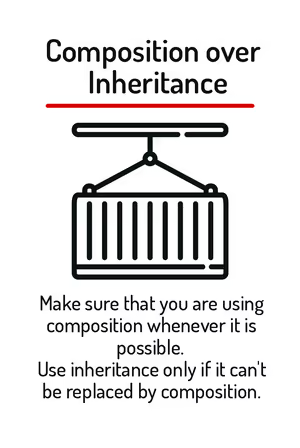Composition over Inheritance

Favor composition over inheritance whenever possible. Inheritance creates tight coupling between classes and can make your code rigid and hard to maintain. Composition lets you build complex behavior by combining small, focused objects, keeping your code flexible and testable.
For example, instead of inheriting a Printer class to add logging:
class LoggingPrinter extends Printer {
@Override
public void print(String message) {
System.out.println("Logging: " + message);
super.print(message);
}
}Use composition to combine behaviors:
class Printer {
public void print(String message) {
//Print with actual printer
}
}
class Logger {
public void log(String message) {
System.out.println("Logging: " + message);
}
}
class LoggingPrinter {
private final Printer printer;
private final Logger logger;
public LoggingPrinter(Printer printer, Logger logger) {
this.printer = printer;
this.logger = logger;
}
public void print(String message) {
logger.log(message);
printer.print(message);
}
}Composition keeps each class focused, reduces coupling, and makes it easy to swap implementations or add new behaviors. Inheritance should only be used when a strict “is-a” relationship exists and cannot be expressed via composition.
Before every commit, review your design: could composition replace inheritance? This simple habit leads to cleaner, more maintainable, and more flexible codebases.